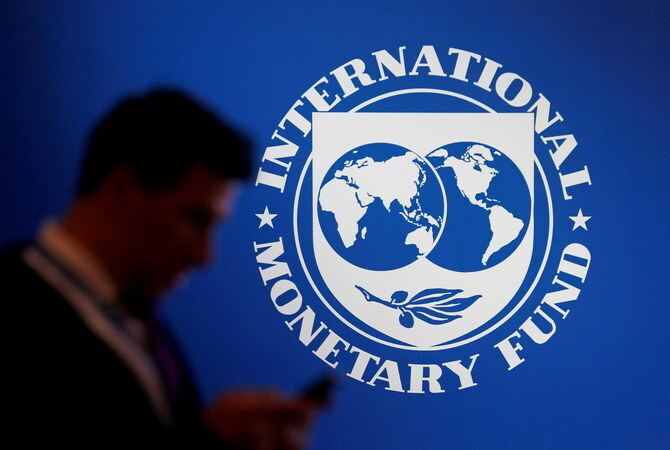KARACHI: A team of experts from the International Monetary Fund (IMF) will be visiting Pakistan in mid-March for the first review of the South Asian country’s $7 billion loan program, an IMF official said on Friday.
A successful review would see the Washington-based lender release around $1 billion tranche to cash-strapped Pakistan, which seeks to boost its foreign exchange reserves to achieve the IMF’s threshold of three-month import cover.
IMF bailouts are critical for Pakistan which narrowly avoided a sovereign default in June 2023 by clinching a last-gasp, $3 billion IMF loan and is currently navigating a tricky path to economic recovery.
“An IMF staff team is scheduled to visit Pakistan in early to mid-March for discussions around the first review under Pakistan’s Extended Fund Facility-supported program,” Mahir Binici, the IMF resident representative in Pakistan, told Arab News in response to a query.
Pakistan, which averted a default in 2023, is currently navigating a path to economic recovery under the $7 billion bailout. The review is expected to revolve around the country’s compliance with its taxation targets and overall structural reforms.
The South Asian country has undertaken several reforms in taxation, energy and others sectors as well as with regard to better management of loss-making state-owned enterprises (SOEs), while provincial governments in Pakistan’s Punjab, Sindh, Khyber Pakhtunkhwa and Balochistan have recently enacted laws to impose taxes on farm incomes in line with the lender’s requirements.
Pakistan’s finance adviser Khurram Schehzad told Arab News in a recent interview that the country was “fully prepared to go into the review process,” adding that the IMF was on board “on the targets and benchmarks that we have achieved as well as only a few we are chasing.”
The South Asian country also seeks to secure an additional $1.5 billion loan from the IMF to deal with climate-related issues under a Resilience and Sustainability Facility (RSF) arrangement.
“In this regard, a technical team will be in Pakistan starting in late February to discuss technical issues related to a possible RSF arrangement,” Binici said.
The Global Climate Risk Index places Pakistan among the countries most vulnerable to climate change.
Floods in 2022, which scientists said were aggravated by global warming, affected at least 33 million people and killed more than 1,700. The country’s economic struggles and high debt burden impinged its ability to respond to the disaster.
IMF mission to visit Pakistan by mid-March to review $7 billion loan program, official says
https://arab.news/85fus
IMF mission to visit Pakistan by mid-March to review $7 billion loan program, official says

- A successful review would see the Washington-based lender release around $1 billion tranche to cash-strapped South Asian country
- Islamabad has also requested IMF for additional $1.5 billion Resilience and Sustainability Facility to deal with climate-related issues
Pakistan cabinet reviews private Hajj policy as mandatory pilgrim training enforced

- Cabinet sends draft Private Hajj Policy 2027–2030 to committee for further review
- Religion minister warns pilgrims who skip mandatory training will be barred from Hajj
ISLAMABAD: Pakistan’s federal cabinet on Wednesday reviewed proposals for stricter oversight of private Hajj operators, as authorities separately warned that pilgrims who failed to complete mandatory training would be barred from performing Hajj next year.
The cabinet, chaired by Prime Minister Shehbaz Sharif, was briefed on a draft Private Hajj Policy for 2027–2030, which includes third-party registration and scrutiny of private Hajj operator companies, according to a statement from the Prime Minister’s Office.
“The Federal Cabinet directed that the draft Private Hajj Policy 2027–2030, presented by the Ministry of Religious Affairs and Interfaith Harmony regarding third-party registration and scrutiny of private Hajj operators’ companies, be referred to the Hajj Policy Committee for further deliberation in light of the views of Cabinet members,” the prime minister’s office said in a statement.
The development comes as Religious Affairs Minister Sardar Muhammad Yousaf said on Wednesday pilgrims who failed to attend both phases of mandatory Hajj training would not be allowed to perform the pilgrimage.
“Pilgrims who do not complete mandatory Hajj training will be barred from performing Hajj,” the ministry quoted Yousaf as saying during a training workshop in Islamabad.
Around 120,000 pilgrims are currently undergoing training at 200 locations nationwide, with the second phase scheduled to begin after Ramadan. The training aims to familiarize pilgrims with Saudi laws, Hajj rituals and safety protocols to prevent accidents in crowded areas.
Saudi Arabia has allocated 179,210 pilgrims to Pakistan for Hajj 2026, including about 118,000 seats under the government scheme, while the remainder will be handled by private tour operators.
Under Pakistan’s government Hajj package, the estimated cost ranges from Rs1.15 million to Rs1.25 million ($4,049.93 to $4,236), subject to final agreements with service providers.










